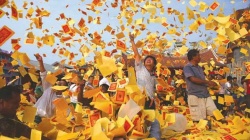Difference between revisions of "Kshetrapala"
(Created page with "thumb|250px| According to {{Wiki|Hinduism}} and {{Wiki|Hindu}} mythology, Kshetrapala, that is, the lord of the farmland, is a deity who was...") |
|||
| (5 intermediate revisions by the same user not shown) | |||
| Line 1: | Line 1: | ||
[[File:0x348.jpg|thumb|250px|]] | [[File:0x348.jpg|thumb|250px|]] | ||
| − | According to {{Wiki|Hinduism}} and {{Wiki|Hindu}} [[mythology]], [[Kshetrapala]], that is, the [[lord]] of the farmland, is a [[deity]] who was originally a [[deity]] of the farmland, particularly in the {{Wiki|south}} [[India]]. Over a period of [[time]], [[Kshetrapala]] became a generic [[name]] applied to [[deities associated with a piece or parcel of land]], or a [[particular region]] ([[kshetra]] in [[Sanskrit]]). His [[temples]] are generally [[constructed]] on the northeastern corner of [[temples]] devoted to {{Wiki|Shiva}}, and he is worshipped prior to each [[ritual]] to ensure the efficacy of that particular [[ritual]]. | + | |
| + | |||
| + | |||
| + | <poem> | ||
| + | According to {{Wiki|Hinduism}} and {{Wiki|Hindu}} [[mythology]], [[Kshetrapala]], that is, the [[lord]] of the farmland, is a [[deity]] who was originally a [[deity]] of the farmland, particularly in the {{Wiki|south}} [[India]]. Over a period of [[time]], | ||
| + | |||
| + | [[Kshetrapala]] became a generic [[name]] applied to [[deities associated with a piece or parcel of land]], or a [[particular region]] ([[kshetra]] in [[Sanskrit]]). | ||
| + | |||
| + | His [[temples]] are generally [[constructed]] on the northeastern corner of [[temples]] devoted to {{Wiki|Shiva}}, and he is [[worshipped]] prior to each [[ritual]] to ensure the efficacy of that particular [[ritual]]. | ||
| + | |||
| + | |||
| + | [[Kshetrapala]] is a [[protector]] of villages and towns from [[evil deities]] and bad men. | ||
| + | |||
| + | |||
| + | He has three different [[forms]], | ||
| + | |||
| + | |||
| + | [[satvika]], | ||
| + | [[rajasa]], and | ||
| + | [[tamasa]]. | ||
| + | |||
| + | |||
| + | |||
| + | Each of these [[forms]] is always found nude and with three [[eyes]], however they each have a different amount of arms. Satvika has either two or four, rajasa has six, and [[tamasa]] has eight. | ||
| + | |||
| + | The {{Wiki|skin}} {{Wiki|color}} also differs with each of [[Kshetrapala's]] [[forms]]. | ||
| + | |||
| + | [[Satvika]] is [[white]], [[rajasa]] [[red]], and [[tamasa]] is [[black]]. All three [[forms]] had red [[hair]], [[standing]] erect on their heads, and all wear ornaments of {{Wiki|snakes}}. His [[vehicle]] is the {{Wiki|dog}}. | ||
| + | |||
The {{Wiki|image}} | The {{Wiki|image}} | ||
| − | [[Kshetrapala’s]] images are awe-inspiring; he is generally depicted naked, and is shown with three [[eyes]] and untidy [[hair]]. He is displayed with wielding a number of [[weapons]] and accompanied by [[shvans]] ({{Wiki|dogs}}). He is sometimes identified with {{Wiki|Bhairava}}. [[Kshetrapala]] [[temple]] is also situated in the village Khadagada, Tehsil Sagwara, district Dungerpur, Rajasthan. | + | [[Kshetrapala’s]] images are awe-inspiring; he is generally depicted naked, and is shown with three [[eyes]] and untidy [[hair]]. He is displayed with wielding a number of [[weapons]] and accompanied by [[Wikipedia:dog|shvans]] ({{Wiki|dogs}}). |
| + | |||
| + | He is sometimes identified with {{Wiki|Bhairava}}. [[Kshetrapala]] [[temple]] is also situated in the village Khadagada, Tehsil Sagwara, district Dungerpur, {{Wiki|Rajasthan}}. | ||
| + | </poem> | ||
{{W}} | {{W}} | ||
[[Category:Dharmapalas]] | [[Category:Dharmapalas]] | ||
Latest revision as of 11:22, 6 November 2015
According to Hinduism and Hindu mythology, Kshetrapala, that is, the lord of the farmland, is a deity who was originally a deity of the farmland, particularly in the south India. Over a period of time,
Kshetrapala became a generic name applied to deities associated with a piece or parcel of land, or a particular region (kshetra in Sanskrit).
His temples are generally constructed on the northeastern corner of temples devoted to Shiva, and he is worshipped prior to each ritual to ensure the efficacy of that particular ritual.
Kshetrapala is a protector of villages and towns from evil deities and bad men.
He has three different forms,
satvika,
rajasa, and
tamasa.
Each of these forms is always found nude and with three eyes, however they each have a different amount of arms. Satvika has either two or four, rajasa has six, and tamasa has eight.
The skin color also differs with each of Kshetrapala's forms.
Satvika is white, rajasa red, and tamasa is black. All three forms had red hair, standing erect on their heads, and all wear ornaments of snakes. His vehicle is the dog.
The image
Kshetrapala’s images are awe-inspiring; he is generally depicted naked, and is shown with three eyes and untidy hair. He is displayed with wielding a number of weapons and accompanied by shvans (dogs).
He is sometimes identified with Bhairava. Kshetrapala temple is also situated in the village Khadagada, Tehsil Sagwara, district Dungerpur, Rajasthan.
